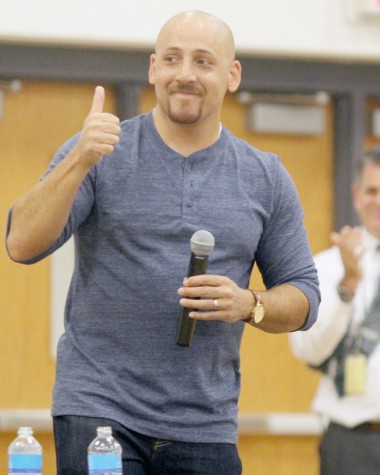A Message of Hope
Speaker shares tips on mental wellness, suicide prevention
Editors’ Note: “The Tiger Print” editors had the opportunity to Skype with Kevin Hines about his presentation and life a week before he came to Blue Valley. This story contains content from that interview.
On Aug. 27 motivational speaker Kevin Hines came to Blue Valley to share his message of hope and suicide prevention.
Hines’ goal is to reach any individual he can who is suffering in silence and get them the help they need. He said his message needs to be heard on a daily basis for those with suicidal thoughts.
“I have chronic suicidal idealations,” Hines said. “I have to keep making the decision to survive and make the cognitive decision to talk about those things immediately as opposed to when it gets to a dangerous spot — where it’s too late.”
Mental illness needs to be dealt with at a younger age, Hines said.
“At the school level, we are making a mistake by not talking about it in grade school,” he said. “We need to set a baseline. If we are going to augment the future of the world to be a place of less suicide, you’re going to have to infiltrate every fourth to fifth grade class. Allowing our students to recognize what mental health is back then [is vital], so when they hit puberty and there are thoughts of an attempt, they know what to do.”
 What everybody needs
What everybody needs
to realize, Hines said, is asking someone if they are thinking about taking their life will not encourage them to do so.
“[Schools] were so worried about instilling in someone’s mind who wasn’t thinking abou
t the idea of suicide,” he said. “They were worried about saying the word and having it be planted. If talked about in a non-sensational manner — that there is hope with treatment, and treatment could lead to a better life — you can go into any place. You can reduce suicide or at least get people to talk about [it].”
Hines said maintaining a healthy mental state can be difficult when students are overrun with a large workload.
“[Students] are devastating their minds — they are devastating their bodies — just to get the grade,”
he said. “It isn’t worth it. As a societal whole, we need to reevaluate how we treat our young, underdeveloped teenage minds before
they go out in the world.”
Hines said talking to high school students is especially important.
“We are going to shape the next generations, and if we can’t keep ourselves alive or we can’t help those teens who are struggling mentally, we are doing a great disservice to the next generations because those minds will be lost,” Hines said. “Teenagers are dying at such alarming rates across the U.S., [which] is completely unacceptable. The government, as well as local groups and organizations, needs to come together and assess this issue and find a solution. I want to be a part of that solution.”
The Art of Wellness: adapted from Kevin Hines’ You Tube videos
Therapy — we may not all have a mental illness, but each one us must deal with our mental health. Everyone of us has issues and experiences stress. Some types of therapy that could benefit anyone: talk therapy — talking to someone who understands, listens and empathizes with your problems. Music therapy — listening to soothing music before sleep can improve sleeping habits and patterns.
Meditation — it can come in many forms. Push out the negative aspects of your life while letting the good parts take over. Changing a negative state of mind to
a positive one is so important.
Exercise — one of the greatest natural anti-depressants in the world; 23 minutes of vigorous cardiovascular or strength-training exercise can lead to 12 hours of better mood. Exercise increases levels of serotonin and releases endorphins, which leads to a better mood throughout the day.
Sleep — the single most important aspect to a healthy mental state. During sleep, your body creates new brain cells to be used the next day. It is also crucial to your body’s ability to heal and cope in any kind of situation.

Sheila Gregory is Co-Editor of “The Tiger Print.” She enjoys writing political opinions and news stories. Along with writing for the paper, Sheila...



